AIHE ISY1000 Ethics: Reflective Journal on Privacy and Data Security
VerifiedAdded on 2023/06/09
|5
|873
|142
Journal and Reflective Writing
AI Summary
This reflective journal explores ethics in Information Technology, focusing on key privacy and anonymity issues such as data breaches, electronic discovery, consumer profiling, workplace monitoring, and advanced surveillance technology. It discusses relevant Australian legislations like the Privacy Act 1988 and their impact on protecting personal data. The journal also highlights the future application of this knowledge by an IT professional in safeguarding personal data through encryption, firewalls, and adherence to privacy laws, emphasizing the importance of reporting data breaches according to ICT policies. This document is available on Desklib, a platform offering a wide range of study resources and AI-based tools for students.
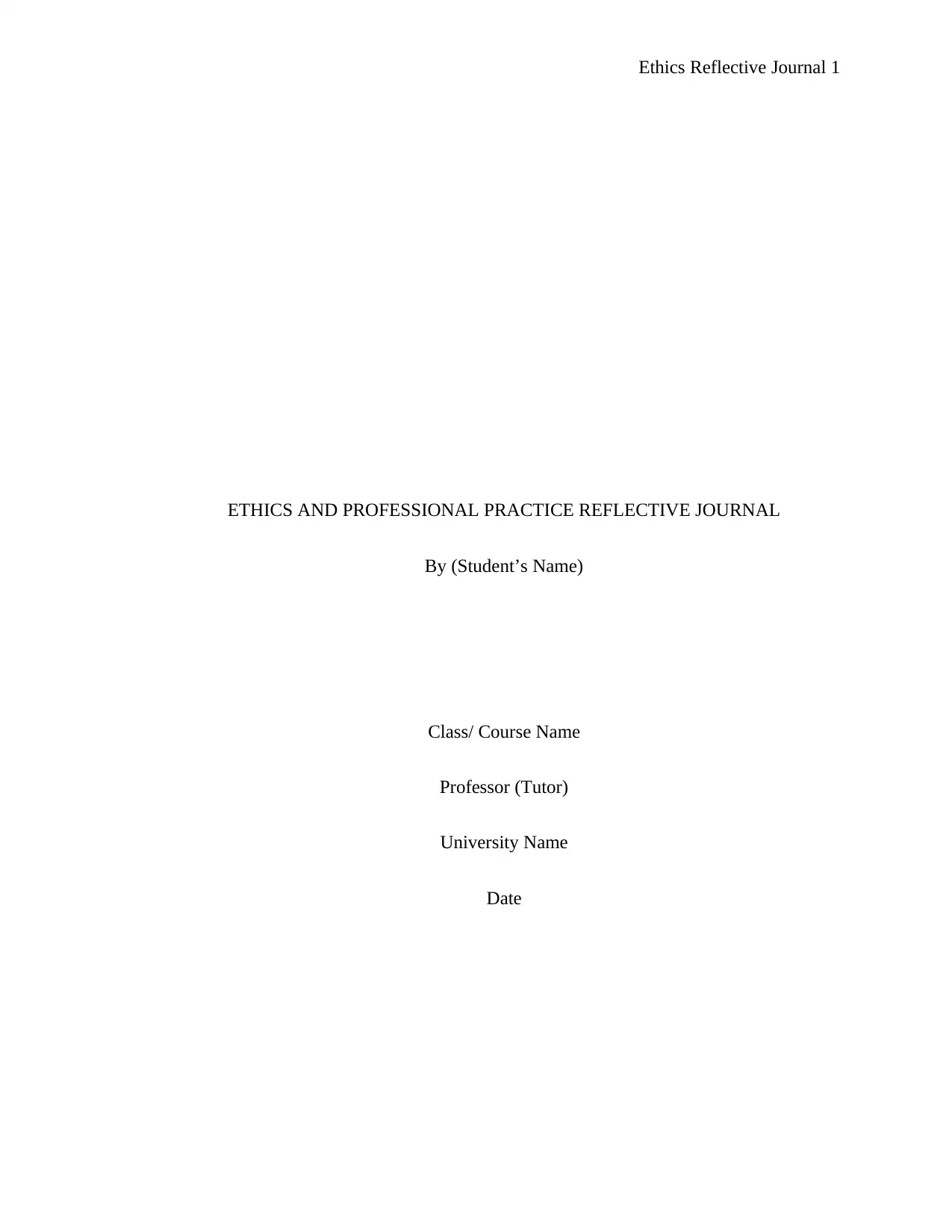
Ethics Reflective Journal 1
ETHICS AND PROFESSIONAL PRACTICE REFLECTIVE JOURNAL
By (Student’s Name)
Class/ Course Name
Professor (Tutor)
University Name
Date
ETHICS AND PROFESSIONAL PRACTICE REFLECTIVE JOURNAL
By (Student’s Name)
Class/ Course Name
Professor (Tutor)
University Name
Date
Paraphrase This Document
Need a fresh take? Get an instant paraphrase of this document with our AI Paraphraser
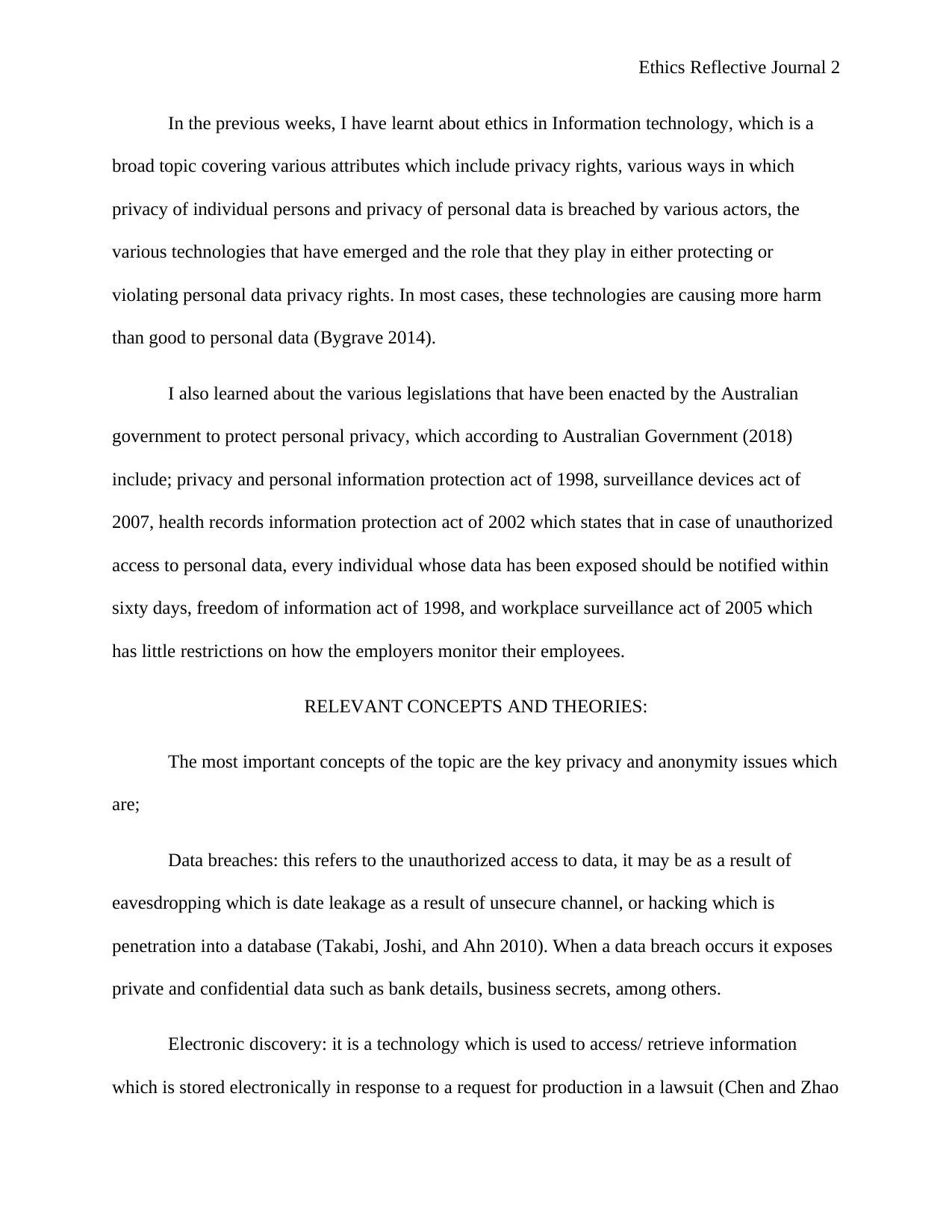
Ethics Reflective Journal 2
In the previous weeks, I have learnt about ethics in Information technology, which is a
broad topic covering various attributes which include privacy rights, various ways in which
privacy of individual persons and privacy of personal data is breached by various actors, the
various technologies that have emerged and the role that they play in either protecting or
violating personal data privacy rights. In most cases, these technologies are causing more harm
than good to personal data (Bygrave 2014).
I also learned about the various legislations that have been enacted by the Australian
government to protect personal privacy, which according to Australian Government (2018)
include; privacy and personal information protection act of 1998, surveillance devices act of
2007, health records information protection act of 2002 which states that in case of unauthorized
access to personal data, every individual whose data has been exposed should be notified within
sixty days, freedom of information act of 1998, and workplace surveillance act of 2005 which
has little restrictions on how the employers monitor their employees.
RELEVANT CONCEPTS AND THEORIES:
The most important concepts of the topic are the key privacy and anonymity issues which
are;
Data breaches: this refers to the unauthorized access to data, it may be as a result of
eavesdropping which is date leakage as a result of unsecure channel, or hacking which is
penetration into a database (Takabi, Joshi, and Ahn 2010). When a data breach occurs it exposes
private and confidential data such as bank details, business secrets, among others.
Electronic discovery: it is a technology which is used to access/ retrieve information
which is stored electronically in response to a request for production in a lawsuit (Chen and Zhao
In the previous weeks, I have learnt about ethics in Information technology, which is a
broad topic covering various attributes which include privacy rights, various ways in which
privacy of individual persons and privacy of personal data is breached by various actors, the
various technologies that have emerged and the role that they play in either protecting or
violating personal data privacy rights. In most cases, these technologies are causing more harm
than good to personal data (Bygrave 2014).
I also learned about the various legislations that have been enacted by the Australian
government to protect personal privacy, which according to Australian Government (2018)
include; privacy and personal information protection act of 1998, surveillance devices act of
2007, health records information protection act of 2002 which states that in case of unauthorized
access to personal data, every individual whose data has been exposed should be notified within
sixty days, freedom of information act of 1998, and workplace surveillance act of 2005 which
has little restrictions on how the employers monitor their employees.
RELEVANT CONCEPTS AND THEORIES:
The most important concepts of the topic are the key privacy and anonymity issues which
are;
Data breaches: this refers to the unauthorized access to data, it may be as a result of
eavesdropping which is date leakage as a result of unsecure channel, or hacking which is
penetration into a database (Takabi, Joshi, and Ahn 2010). When a data breach occurs it exposes
private and confidential data such as bank details, business secrets, among others.
Electronic discovery: it is a technology which is used to access/ retrieve information
which is stored electronically in response to a request for production in a lawsuit (Chen and Zhao
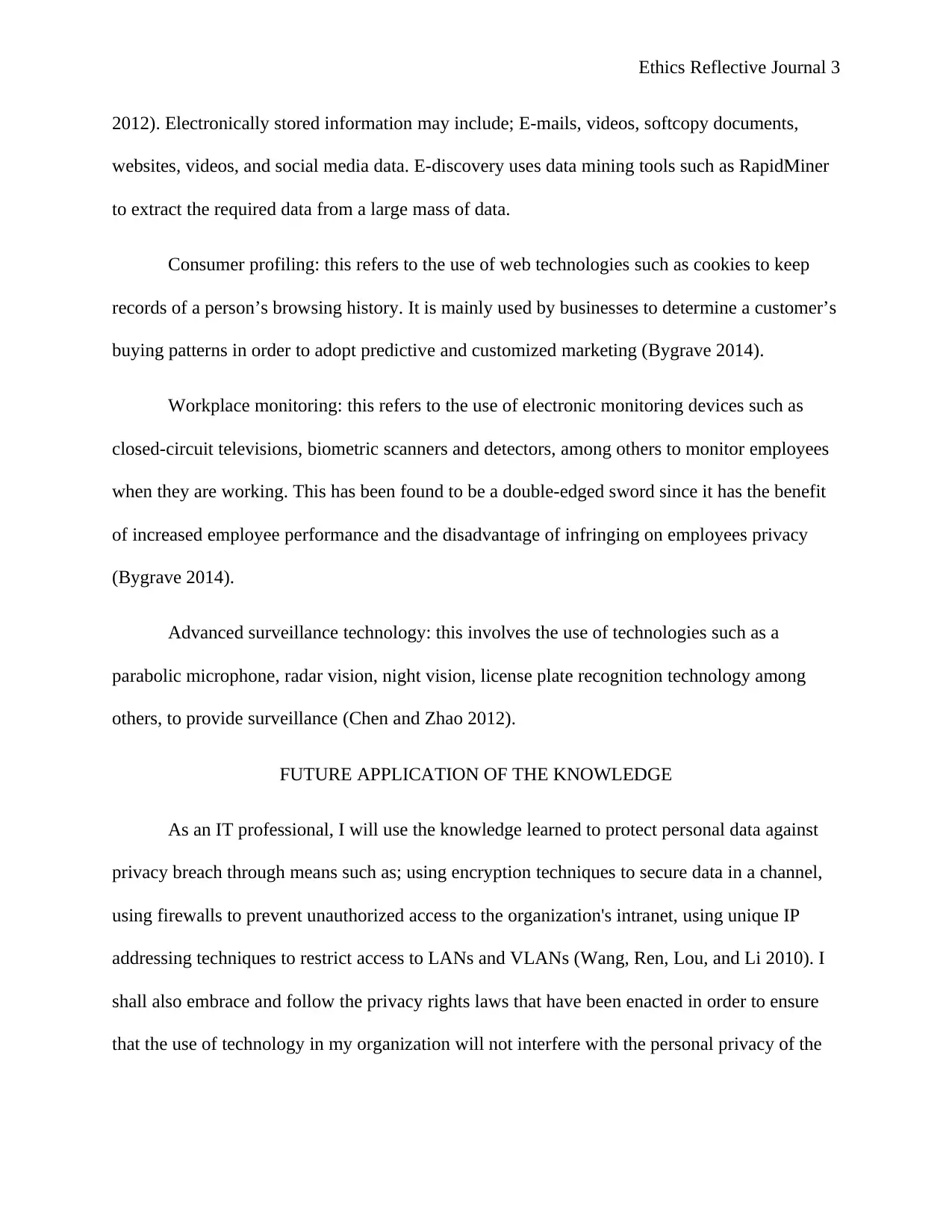
Ethics Reflective Journal 3
2012). Electronically stored information may include; E-mails, videos, softcopy documents,
websites, videos, and social media data. E-discovery uses data mining tools such as RapidMiner
to extract the required data from a large mass of data.
Consumer profiling: this refers to the use of web technologies such as cookies to keep
records of a person’s browsing history. It is mainly used by businesses to determine a customer’s
buying patterns in order to adopt predictive and customized marketing (Bygrave 2014).
Workplace monitoring: this refers to the use of electronic monitoring devices such as
closed-circuit televisions, biometric scanners and detectors, among others to monitor employees
when they are working. This has been found to be a double-edged sword since it has the benefit
of increased employee performance and the disadvantage of infringing on employees privacy
(Bygrave 2014).
Advanced surveillance technology: this involves the use of technologies such as a
parabolic microphone, radar vision, night vision, license plate recognition technology among
others, to provide surveillance (Chen and Zhao 2012).
FUTURE APPLICATION OF THE KNOWLEDGE
As an IT professional, I will use the knowledge learned to protect personal data against
privacy breach through means such as; using encryption techniques to secure data in a channel,
using firewalls to prevent unauthorized access to the organization's intranet, using unique IP
addressing techniques to restrict access to LANs and VLANs (Wang, Ren, Lou, and Li 2010). I
shall also embrace and follow the privacy rights laws that have been enacted in order to ensure
that the use of technology in my organization will not interfere with the personal privacy of the
2012). Electronically stored information may include; E-mails, videos, softcopy documents,
websites, videos, and social media data. E-discovery uses data mining tools such as RapidMiner
to extract the required data from a large mass of data.
Consumer profiling: this refers to the use of web technologies such as cookies to keep
records of a person’s browsing history. It is mainly used by businesses to determine a customer’s
buying patterns in order to adopt predictive and customized marketing (Bygrave 2014).
Workplace monitoring: this refers to the use of electronic monitoring devices such as
closed-circuit televisions, biometric scanners and detectors, among others to monitor employees
when they are working. This has been found to be a double-edged sword since it has the benefit
of increased employee performance and the disadvantage of infringing on employees privacy
(Bygrave 2014).
Advanced surveillance technology: this involves the use of technologies such as a
parabolic microphone, radar vision, night vision, license plate recognition technology among
others, to provide surveillance (Chen and Zhao 2012).
FUTURE APPLICATION OF THE KNOWLEDGE
As an IT professional, I will use the knowledge learned to protect personal data against
privacy breach through means such as; using encryption techniques to secure data in a channel,
using firewalls to prevent unauthorized access to the organization's intranet, using unique IP
addressing techniques to restrict access to LANs and VLANs (Wang, Ren, Lou, and Li 2010). I
shall also embrace and follow the privacy rights laws that have been enacted in order to ensure
that the use of technology in my organization will not interfere with the personal privacy of the
⊘ This is a preview!⊘
Do you want full access?
Subscribe today to unlock all pages.

Trusted by 1+ million students worldwide
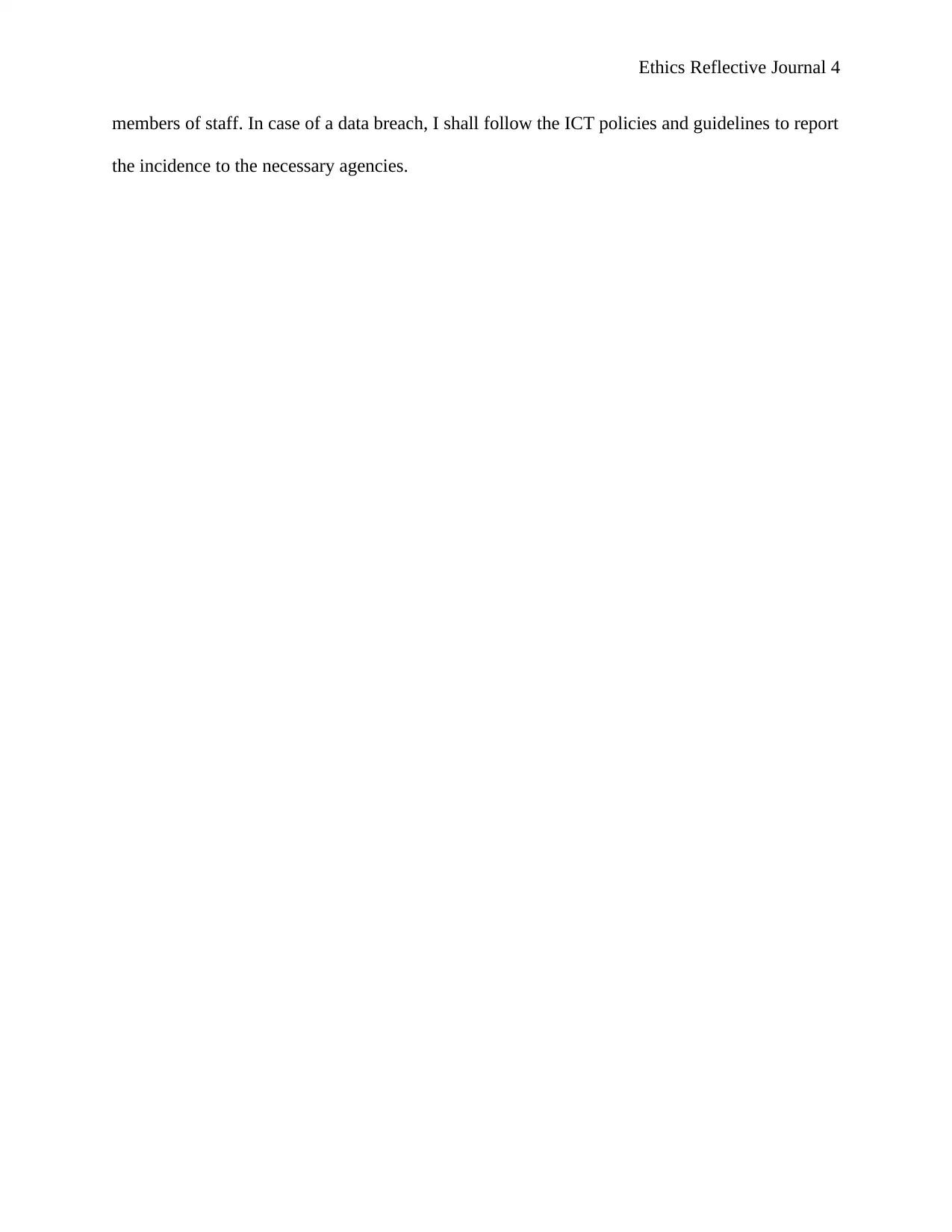
Ethics Reflective Journal 4
members of staff. In case of a data breach, I shall follow the ICT policies and guidelines to report
the incidence to the necessary agencies.
members of staff. In case of a data breach, I shall follow the ICT policies and guidelines to report
the incidence to the necessary agencies.
Paraphrase This Document
Need a fresh take? Get an instant paraphrase of this document with our AI Paraphraser
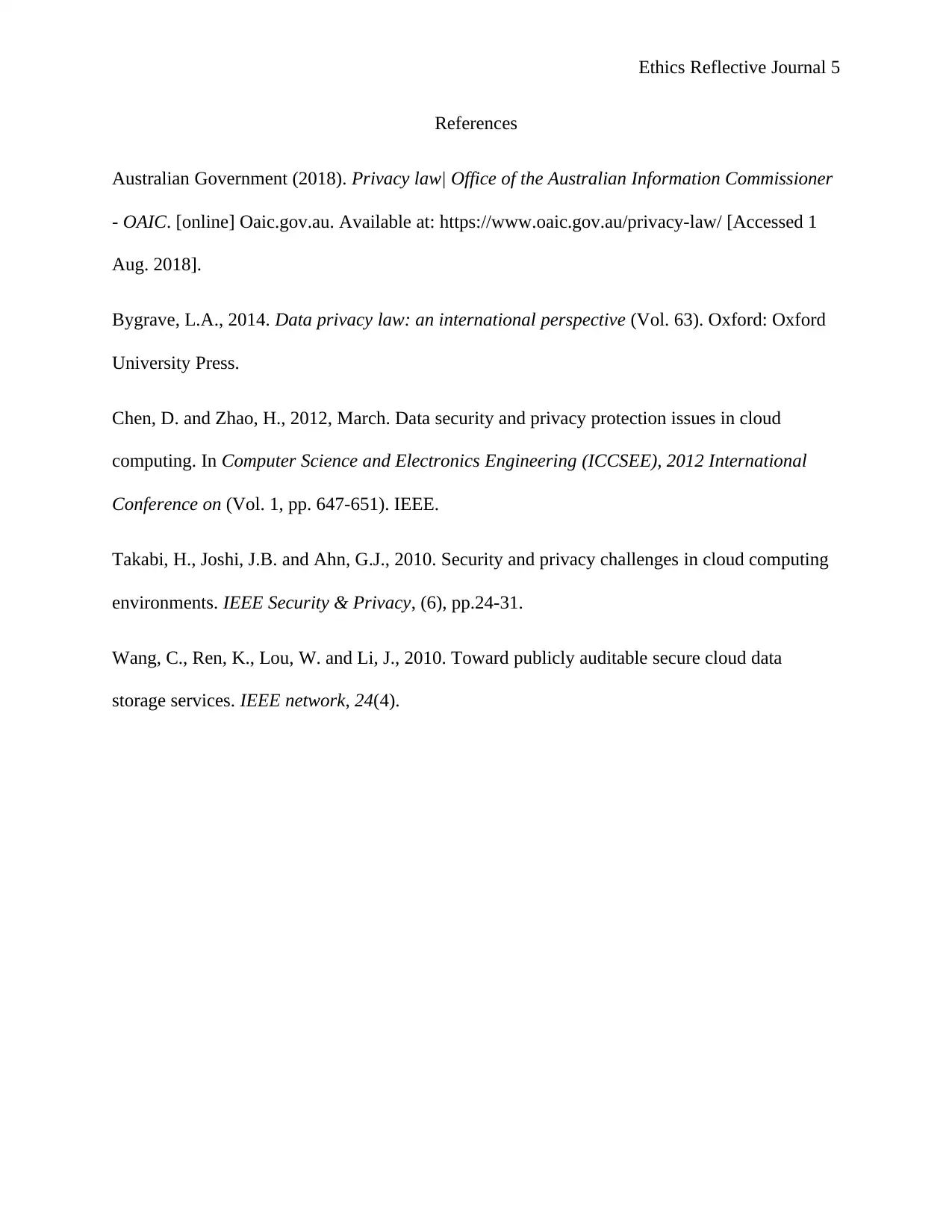
Ethics Reflective Journal 5
References
Australian Government (2018). Privacy law| Office of the Australian Information Commissioner
- OAIC. [online] Oaic.gov.au. Available at: https://www.oaic.gov.au/privacy-law/ [Accessed 1
Aug. 2018].
Bygrave, L.A., 2014. Data privacy law: an international perspective (Vol. 63). Oxford: Oxford
University Press.
Chen, D. and Zhao, H., 2012, March. Data security and privacy protection issues in cloud
computing. In Computer Science and Electronics Engineering (ICCSEE), 2012 International
Conference on (Vol. 1, pp. 647-651). IEEE.
Takabi, H., Joshi, J.B. and Ahn, G.J., 2010. Security and privacy challenges in cloud computing
environments. IEEE Security & Privacy, (6), pp.24-31.
Wang, C., Ren, K., Lou, W. and Li, J., 2010. Toward publicly auditable secure cloud data
storage services. IEEE network, 24(4).
References
Australian Government (2018). Privacy law| Office of the Australian Information Commissioner
- OAIC. [online] Oaic.gov.au. Available at: https://www.oaic.gov.au/privacy-law/ [Accessed 1
Aug. 2018].
Bygrave, L.A., 2014. Data privacy law: an international perspective (Vol. 63). Oxford: Oxford
University Press.
Chen, D. and Zhao, H., 2012, March. Data security and privacy protection issues in cloud
computing. In Computer Science and Electronics Engineering (ICCSEE), 2012 International
Conference on (Vol. 1, pp. 647-651). IEEE.
Takabi, H., Joshi, J.B. and Ahn, G.J., 2010. Security and privacy challenges in cloud computing
environments. IEEE Security & Privacy, (6), pp.24-31.
Wang, C., Ren, K., Lou, W. and Li, J., 2010. Toward publicly auditable secure cloud data
storage services. IEEE network, 24(4).
1 out of 5
Related Documents
Your All-in-One AI-Powered Toolkit for Academic Success.
+13062052269
info@desklib.com
Available 24*7 on WhatsApp / Email
![[object Object]](/_next/static/media/star-bottom.7253800d.svg)
Unlock your academic potential
Copyright © 2020–2026 A2Z Services. All Rights Reserved. Developed and managed by ZUCOL.





